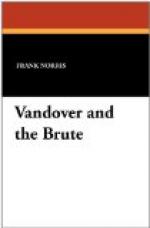Public opinion had been a great check upon him, the fear of scandal, the desire to stand well with the world he knew. Trivial though he felt it to be, the dread of what people would say had to a great extent held Vandover back. He had a position to maintain, a reputation to keep up in the parlours and at the dinner tables where he was received. It could not be denied that society had influenced Vandover for good. But this, too, like all the others, he had cast from him. Now he was ostracized, society cared no longer what he did, his position was gone, his reputation was destroyed. There was no one now to stand in his way.
Vandover could not fall back on any religious influence. Religion had never affected him very deeply. It was true that he had been baptized, confirmed, and had gone to church with considerable regularity. If he had been asked if he was a Christian and believed in God he would have answered “Certainly, certainly.” Until the time of his father’s death he had even said his prayers every night, the last thing before turning out the gas, sitting upon the edge of his bed in his night-gown, his head in both his hands. He added to the Lord’s Prayer certain other petitions as to those who were in trouble, sorrow, poverty, or any other privations; he asked for blessings upon his father and upon himself, praying for the former’s health and prosperity, and for himself, that he might become a great artist, that the “Last Enemy” might be admitted to the Salon when he had painted it, and that it might make him famous. But, as a rule, Vandover thought very little about religious matters and when he did, told himself that he was too intelligent to believe in a literal heaven, a literal hell, and a personal God personally interfering in human affairs like any Jove or Odin. But the moment he rejected a concrete religion Vandover was almost helpless. He was not mystic enough to find any meaning in signs or symbols, nor philosophic enough to grasp vague and immense abstractions. Infinities, Presences, Forces, could not help him withstand temptation,




